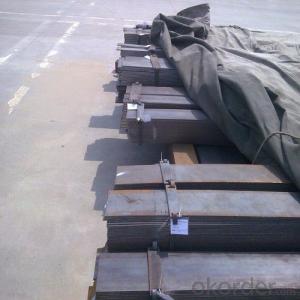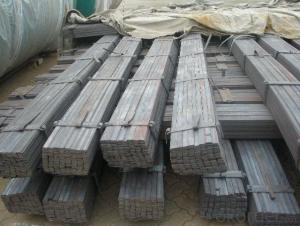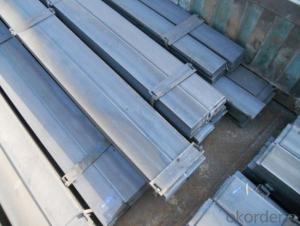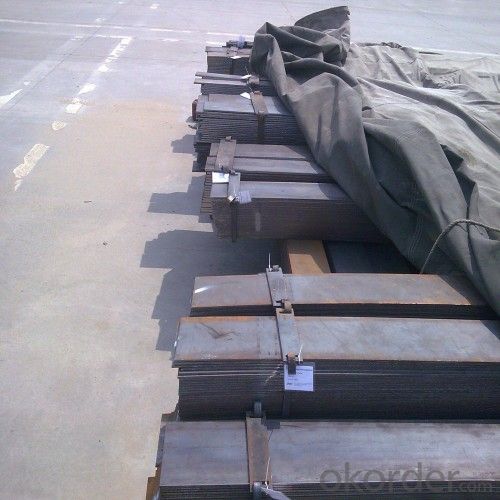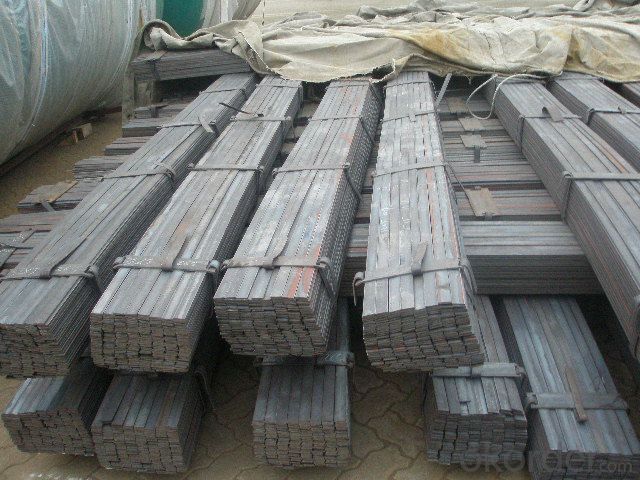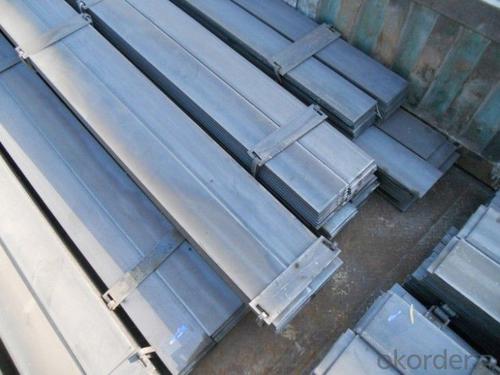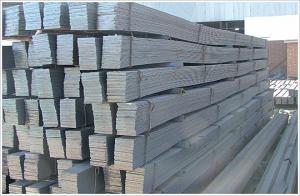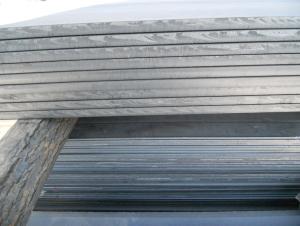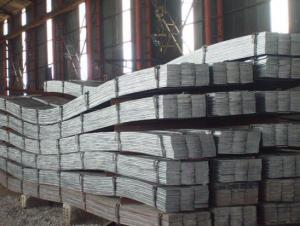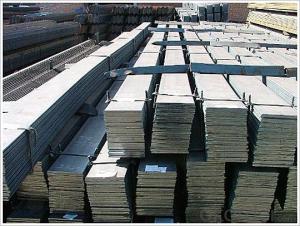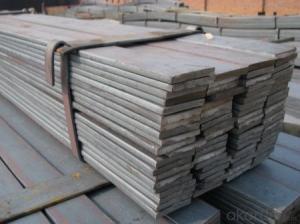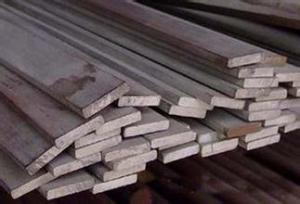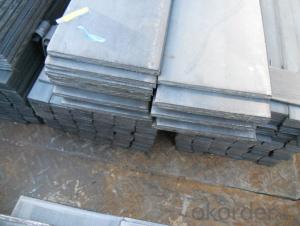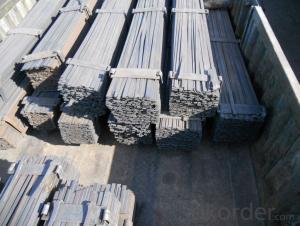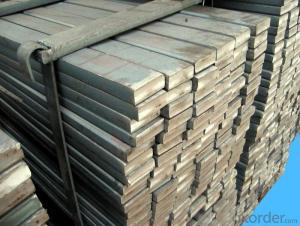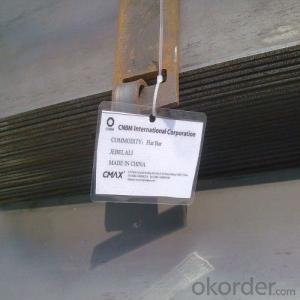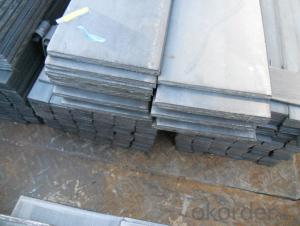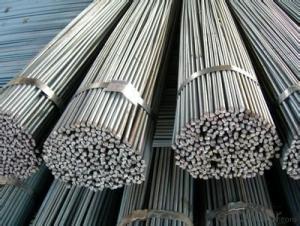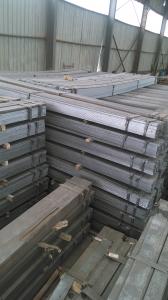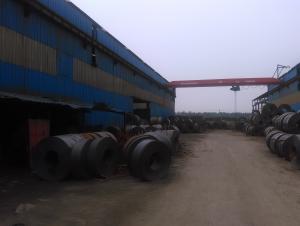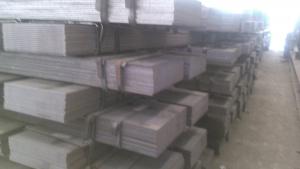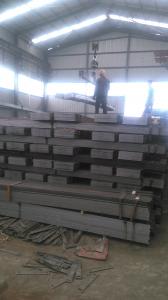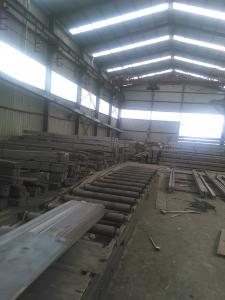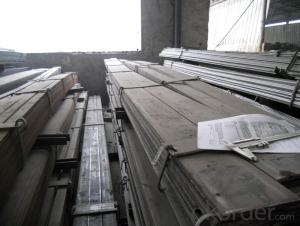Hot Rolled Steel Flat Bars in Material Grade Q235B
- Loading Port:
- Tianjin
- Payment Terms:
- TT OR LC
- Min Order Qty:
- 25 m.t.
- Supply Capability:
- 10000 m.t./month
OKorder Service Pledge
OKorder Financial Service
You Might Also Like
Product Description:
OKorder is offering high quality Hot Rolled Steel Flat bars at great prices with worldwide shipping. Our supplier is a world-class manufacturer of steel, with our products utilized the world over. OKorder annually supplies products to European, North American and Asian markets. We provide quotations within 24 hours of receiving an inquiry and guarantee competitive prices.
Product Applications:
Hot Rolled Steel Flat bars are ideal for structural applications and are widely used in the construction of buildings and bridges, and the manufacturing, petrochemical, and transportation industries.
Product Advantages:
OKorder's Steel Flat bars are durable, strong, and resist corrosion.
Main Product Features:
· Premium quality
· Prompt delivery & seaworthy packing (30 days after receiving deposit)
· Corrosion resistance
· Can be recycled and reused
· Mill test certification
· Professional Service
· Competitive pricing
Product Specifications:
Manufacture: Hot rolled
Grade: Q195 – 235
Certificates: ISO, SGS, BV, CIQ
Length: 6m – 12m, as per customer request
Packaging: Export packing, nude packing, bundled
Chemical composition of Q235
Alloy No | Grade | Element(%) | ||||
C | Mn | S | P | Si | ||
Q235 | B | 0.12—0.20 | 0.3—0.7 | ≤0.045 | ≤0.045 | ≤0.3 |
Physical properties of Q235
Alloy No | Grade | Yielding strength point(Mpa) | Tensile strength (Mpa) | Elongation after fracture(%) | ||||||
Thickness (mm) | Thickness (mm) | |||||||||
≤16 | >16--40 | >40--60 | >60--100 | ≤16 | >16--40 | >40--60 | >60--100 | |||
≥ | ≥ | |||||||||
Q235 | B | 235 | 225 | 215 | 205 | 375--500 | 26 | 25 | 24 | 23 |
FAQ:
Q1: Why buy Materials & Equipment from OKorder.com?
A1: All products offered by OKorder.com are carefully selected from China's most reliable manufacturing enterprises. Through its ISO certifications, OKorder.com adheres to the highest standards and a commitment to supply chain safety and customer satisfaction.
Q2: How do we guarantee the quality of our products?
A2: We have established an advanced quality management system which conducts strict quality tests at every step, from raw materials to the final product. At the same time, we provide extensive follow-up service assurances as required.
Q3: How soon can we receive the product after purchase?
A3: Within three days of placing an order, we will begin production. The specific shipping date is dependent upon international and government factors, but is typically 7 to 10 workdays.
Images:
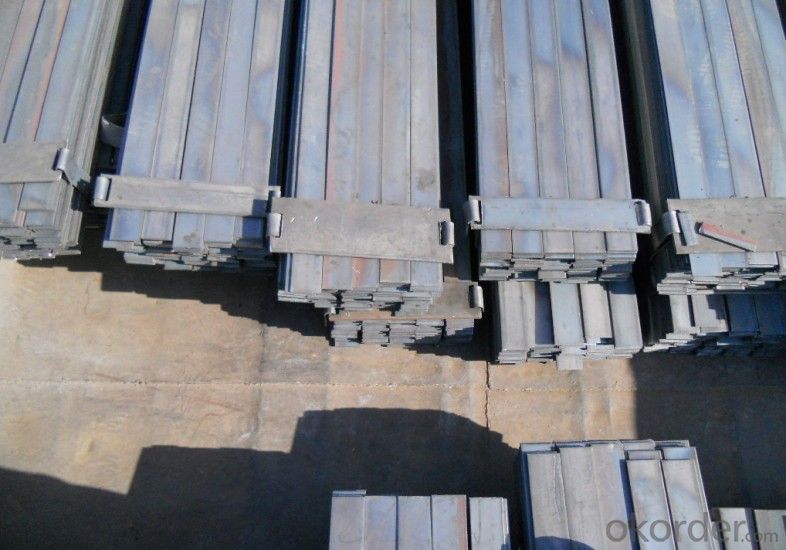
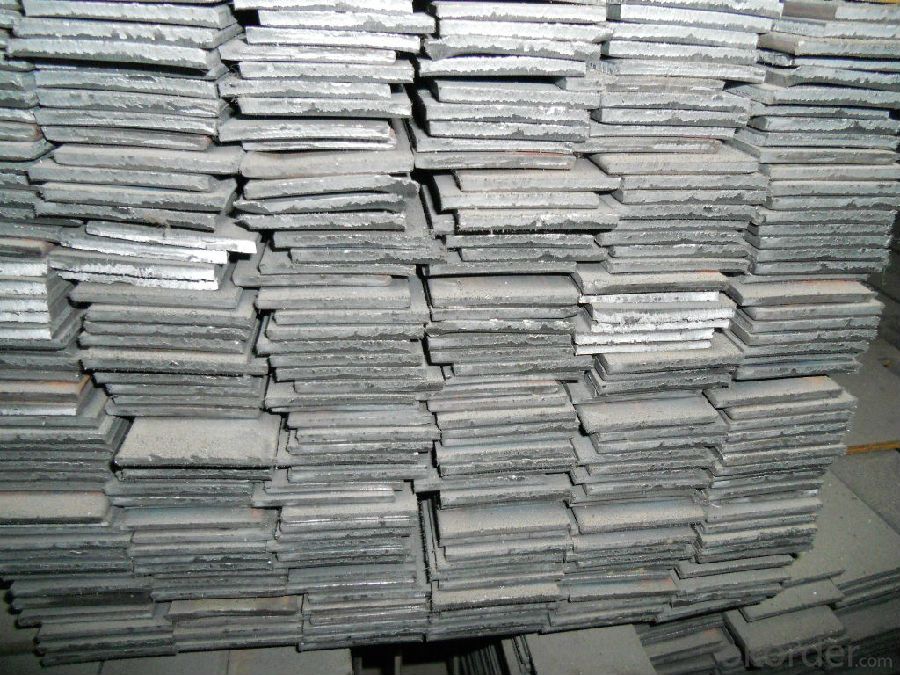
- Q: Are steel flat bars suitable for marine applications?
- Yes, steel flat bars are suitable for marine applications. They are widely used in marine construction due to their high strength, durability, and corrosion resistance. The steel is typically treated to prevent rusting and withstand the harsh marine environment, making it a reliable choice for various marine applications such as shipbuilding, offshore platforms, and marine equipment.
- Q: Are steel flat bars used in structural engineering?
- Steel flat bars are a common choice in structural engineering for a variety of applications. These versatile flat bars can be used to construct beams, columns, braces, and other structural elements. They provide essential support and stability in buildings, bridges, and infrastructure projects. Steel flat bars are renowned for their strength, durability, and resistance to deformation, making them an excellent option in structural engineering. They can be effortlessly welded, bolted, or riveted to other steel components, enabling efficient and cost-effective construction. In summary, steel flat bars are vital in structural engineering and have extensive use in the industry.
- Q: What are the different types of surface treatments available for steel flat bars?
- There are several different types of surface treatments available for steel flat bars, each offering unique benefits and characteristics. Some of the most common types include: 1. Hot-dip galvanizing: This process involves immersing the steel flat bar in a bath of molten zinc, creating a protective layer that prevents corrosion and rust. Hot-dip galvanizing provides excellent durability and resistance to atmospheric conditions. 2. Powder coating: This technique involves applying a powdered polymer coating to the surface of the steel flat bar. The powder is electrostatically charged and then cured under heat, creating a tough and durable finish. Powder coating provides excellent resistance to impact, abrasion, and chemicals, while also offering a wide range of colors and finishes. 3. Electroplating: Electroplating involves depositing a thin layer of metal onto the steel flat bar through an electrochemical process. This can be done with various metals such as chromium, nickel, or zinc, depending on the desired properties. Electroplating enhances the appearance, corrosion resistance, and wear resistance of the steel. 4. Paint coating: Applying a paint coating to the steel flat bar is a common method of surface treatment. This can be done through various techniques such as spray painting or roller coating. Paint coatings not only provide a decorative finish but also offer protection against corrosion and environmental factors. 5. Anodizing: Anodizing is a process primarily used for aluminum, but it can also be applied to steel. It involves creating a controlled oxidization layer on the surface of the metal, which enhances corrosion resistance and provides an attractive finish. Anodizing can be done in various colors and provides excellent durability. 6. Phosphating: Phosphating involves treating the steel flat bar with a phosphate coating, usually through immersion in a solution containing phosphoric acid and other chemicals. This creates a thin, crystalline layer that enhances corrosion resistance and improves the adhesion of subsequent coatings or paints. These are just a few examples of the different surface treatments available for steel flat bars. The choice of treatment depends on factors such as the desired appearance, environmental conditions, and specific functional requirements of the steel flat bar.
- Q: What are the common factors affecting the price of steel flat bars?
- The price of steel flat bars can be influenced by several factors that are commonly observed. 1. Raw material costs have a significant impact on the price of steel flat bars. The prices of raw materials like iron ore, coal, and scrap metal can fluctuate, leading to changes in the overall cost of production and, consequently, the price of steel flat bars. 2. The dynamics of supply and demand play a crucial role in determining the price of steel flat bars, just like any other commodity. If the demand for steel flat bars is high and the supply is limited, the price is likely to increase. Conversely, if the supply exceeds the demand, prices may decrease. 3. The price of steel flat bars can also be affected by the costs associated with manufacturing and processing. These costs include labor, energy, transportation, and other production-related expenses. Any changes in these costs, such as increased wages or electricity prices, can impact the final price of steel flat bars. 4. Market competition within the steel industry can influence the price of steel flat bars. When there are numerous suppliers offering similar products, the market becomes more competitive, leading to lower prices. Conversely, if there are fewer competitors, prices may increase. 5. Government regulations and trade policies, such as import tariffs or quotas, can significantly impact the price of steel flat bars. These policies can either restrict or promote the import and export of steel, which can affect the overall supply and demand dynamics and subsequently influence prices. 6. The price of steel flat bars can also be influenced by the overall economic conditions. During periods of economic growth and high construction activity, the demand for steel flat bars tends to increase, resulting in higher prices. Conversely, during economic downturns or recessions, demand may decrease, leading to lower prices. It is important to note that the combination of these factors can vary depending on the specific market and region. Additionally, external factors such as natural disasters, geopolitical events, and currency exchange rates can also impact the price of steel flat bars.
- Q: Can steel flat bars be used for making construction equipment or vehicles?
- Yes, steel flat bars can be used for making construction equipment or vehicles. Steel flat bars are versatile and commonly used in various industries, including construction and automotive. They offer high strength, durability, and excellent load-bearing capabilities, making them suitable for manufacturing heavy-duty equipment and vehicles. Steel flat bars can be shaped, cut, and welded to meet specific design requirements, allowing for the creation of custom components and structures. Additionally, their corrosion-resistant properties ensure longevity, making them a reliable choice for construction equipment and vehicles subjected to harsh environments and heavy use. Overall, steel flat bars are a popular material for construction and automotive applications due to their strength, versatility, and reliability.
- Q: What are the different types of edge finishes for steel flat bars?
- Steel flat bars can be finished in various ways, each serving a specific purpose and offering a unique aesthetic appeal. Some commonly used edge finishes include: 1. Mill Finish: The standard finish for steel flat bars is a rough, slightly rounded edge that remains unchanged after cutting. 2. Deburred: This finish involves smoothing out the rough edges of the steel flat bar using a deburring tool or process. It creates a cleaner and safer edge, reducing the risk of injury from sharp edges. 3. Rounded: In this finish, the edges of the steel flat bar are made smooth and curved, giving it a sleek appearance. Grinding or milling can be used to achieve this effect. 4. Beveled: Beveled edge finishes require cutting or grinding the edges of the steel flat bar at an angle, creating a sloping edge. This not only enhances the aesthetic appeal but also improves the bar's structural integrity and resistance to chipping or cracking. 5. Polished: Polished edge finishes involve buffing or grinding the edges of the steel flat bar to create a smooth and glossy surface. The desired appearance can range from a mirror-like finish to a satin finish. 6. Chamfered: Chamfered edge finishes involve cutting or grinding the edges of the steel flat bar at a specific angle, usually 45 degrees, to create a beveled edge. This is often done to remove sharp corners, making the bar safer and easier to handle. These examples illustrate the variety of edge finishes available for steel flat bars. The choice of finish depends on the bar's intended use, desired appearance, and any specific functional requirements.
- Q: Are steel flat bars easy to work with?
- Yes, steel flat bars are generally easy to work with. They can be cut, bent, drilled, and welded easily, making them suitable for various construction and DIY projects.
- Q: Are steel flat bars suitable for making machinery frames or chassis?
- Yes, steel flat bars are suitable for making machinery frames or chassis. Steel is known for its high strength and durability, making it an ideal choice for constructing sturdy and reliable machinery frames or chassis. The flat shape of the bars allows for easy fabrication and welding, enabling the construction of frames or chassis with precise dimensions and structural integrity. Additionally, steel has excellent load-bearing capabilities, making it capable of withstanding heavy loads and providing stability to the machinery. Moreover, steel is readily available and cost-effective compared to other materials, making it a popular choice for constructing machinery frames or chassis in various industries.
- Q: Can steel flat bars be used in the construction of pipelines?
- Yes, steel flat bars can be used in the construction of pipelines. They are commonly utilized for various applications in pipeline construction, such as providing support, reinforcement, and structural integrity. Steel flat bars offer high strength, durability, and resistance to corrosion, making them suitable for withstanding the demands of pipeline environments.
- Q: Can steel flat bars be used for making marine equipment or structures?
- Yes, steel flat bars can be used for making marine equipment or structures. Steel is a commonly used material in the marine industry due to its strength, durability, and corrosion resistance. Flat bars can be used for various applications such as constructing ship hulls, offshore platforms, or marine equipment like mooring bollards or boat ramps. However, it is important to choose the appropriate grade of steel that meets the specific requirements and standards for marine applications to ensure longevity and safety in harsh marine environments.
Send your message to us
Hot Rolled Steel Flat Bars in Material Grade Q235B
- Loading Port:
- Tianjin
- Payment Terms:
- TT OR LC
- Min Order Qty:
- 25 m.t.
- Supply Capability:
- 10000 m.t./month
OKorder Service Pledge
OKorder Financial Service
Similar products
Hot products
Hot Searches
Related keywords
